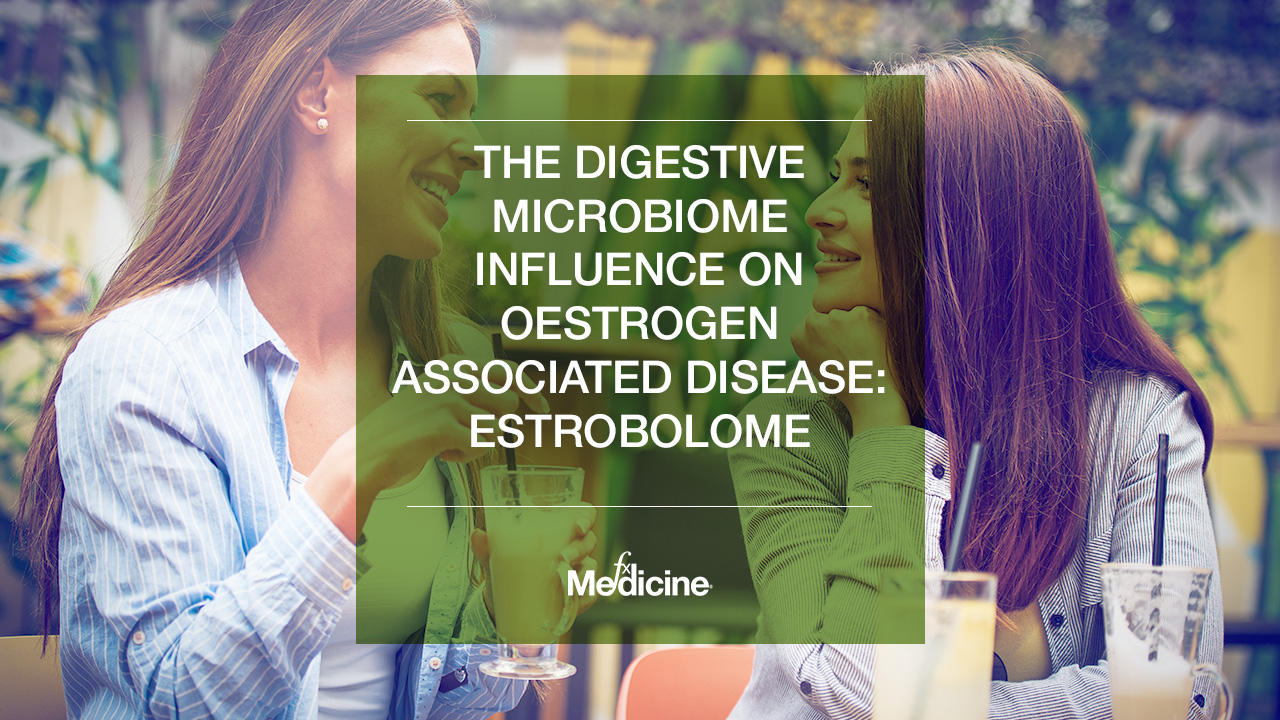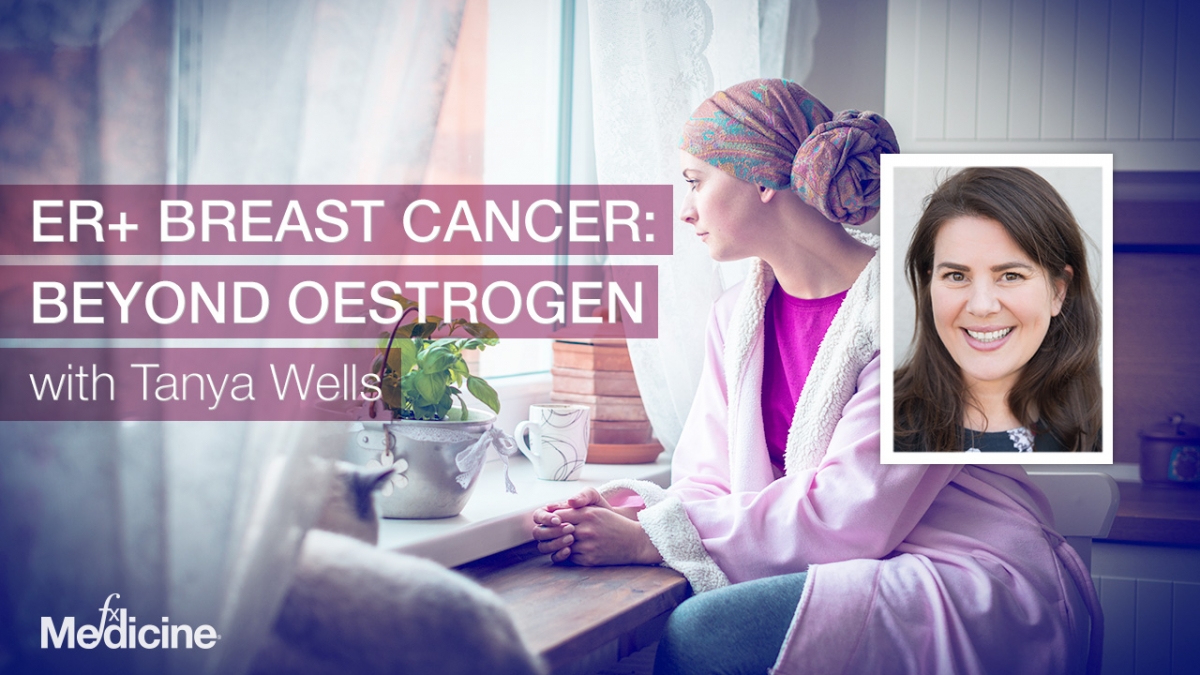Moira Bradfield-Strydom ● 3 min read
The role of bacteria within the human body is increasingly being shown to have a diverse range of effects on health and disease. A relatively new microbiome concept, within the body, is that of the estrobolome. This is the congregation of bacterial genetic enzyme expression, which influences oestrogen kinetics[1] and is responsible for metabolising oestrogen.
Factors like genetics, liver metabolism efficacy, monthly fluctuation of hormones, health status, exogenous impacts such as diet, chemical exposure and pharmaceuticals can all change how oestrogen is metabolised and excreted and thus influence circulating oestrogen levels. Gastrointestinal (GI) microbes have been identified that influence both risk and protection from oestrogen-associated disease states. This knowledge makes microbiome composition an important consideration in oestrogen-related health status.
GI microbes have been identified that are capable of metabolising phytoestrogens such as isoflavones and lignans, converting them into protective metabolites with possible benefit in breast cancer. These include Coriobacteriaceae, such as Eggerthella lenta (lignin metabolism), and Slackia and Adlercreutzia genera which are equol producers.[2,3] This knowledge supports the concept of eubiosis (healthy living) aligning with disease protection.
The metabolism and clearance of circulating oestrogen, via hepatic conjugation pathways sulphonation and glucuronidation, results in conjugated molecules that are biliary excreted. Delivery via bile into the small intestine results in fibre binding in the intestine and subsequent exit via the rectum or reabsorption and entrance back into circulation (entero hepatic recycle). Oestrogen-associated disease risk is linked to GI-based deconjugation and subsequent reabsorption of previously metabolised oestrogens. Prior to reabsorption, conjugated oestrogens are deconjugated via bacterial species possessing ß-glucuronidase and ß-glucosidase functionality. The expression of these two key deconjugation enzymes have been found to be linked to GI microbial diversity.
The expression of ß-glucuronidase enzymes is found in the Bacteriodetes, Firmicutes and Proteobacteria phyla, all containing beneficial commensal and pathobiont species strains that possess the genetic enzyme expression. The Firmicutes phylum contains ß-glucuronidase enzyme producers mainly belonging to Clostridium leptum and Clostridium coccoides clusters. The Proteobacteria phylum contains the Escherichia/Shigella bacterial group which possess the ß-glucuronidase enzyme.[4] As microbial diversity decreases the possibility of higher expression of ß-glucuronidase by dense clusters of single species microbes increases. Possibly raising oestrogen-associated disease risk.
RELATED PODCAST - ER+ Breast Cancer: Beyond Oestrogen with Tanya Wells
In 2016, a review article examined the relationship between the intestinal microbiome and oestrogen receptor positive (ER+) female breast cancer.[1] Increased understanding of the role of bacterial influences on oestrogen supports the GI microbiome impact on circulating free oestrogen status. Within the review, dysbiosis was identified as being associated with ER+ disease status. Testing of the microbiomes of postmenopausal women pre-treatment for ER+ breast cancer showed a less diverse faecal microbiome compared to the control subjects. Linking correlation between the intestinal microbiome and the risk of ER+ breast cancer with higher circulating level of unbound (deconjugated) oestrogens.[1]
In a clinical setting, there are already known parameters that can be manipulated to influence oestrogen pharmacokinetics such as GI clearance, liver pathway substrates and cofactors. The direct manipulation of the GI microbiome is also a viable option to change oestrogen status.
A 2008 randomised crossover study looked at a variety of prebiotic and probiotic interventions and their effect on ß-glucuronidase activity in 53 health volunteers. Consumption of the prebiotics lactulose and oligofructose-enriched inulin was shown to decrease ß-glucuronidase activity, as was consumption of Lactobacillus casei Shirota and Bifidobacterium breve.[5] Both prebiotic and probiotic supplementation are known practices associated with increasing microbial diversity.
The ability to impact oestrogen levels by addressing the GI microbiome and its associated estrobolome opens further pathways of treatment and intervention for practitioners.
References:
- Kwa M, Plottel CS, Blaser MJ, et al. The intestinal microbiome and estrogen receptor-positive female breast cancer. J Nat Can Inst 2016;108(8), [Abstract]
- Clavel T, Borrmann D, Braune A, et al. Occurrence and activity of human intestinal bacteria involved in the conversion of dietary lignans. Anaerobe 2006;12:140-147, [Abstract]
- Matthies A, Loh G, Blaut M, et al. Daidzein and genistein are converted to equol and 5-hydroxy-equol by human intestinal Slackia isoflavoniconvertens in gnotobiotic rats. J Nutr 2012;142:40-46, [Abstract]
- Luu TH, Michel C, Bard J, et al. Intestinal proportion of Blautia sp. is associated with clinical stage and histoprognostic grade in patients with early-stage breast cancer. Nutrition And Cancer 2017;69(2):267-275, [Abstract]
- De Preter V, Raemen H, Cloetens L, et al. Effect of dietary intervention with different pre- and probiotics on intestinal bacterial enzyme activities. European J Clin Nutr 2007, [Abstract]



